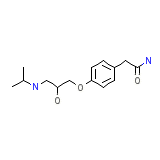Atenol Quesada




Atenol Quesada Brand names, Atenol Quesada Analogs
- Aircrit
- Alinor
- Altol
- Anselol
- Antipressan
- Apo-Atenolol
- Atcardil
- Atecard
- Atehexal
- Atenblock
- Atendol
- Atenet
- Ateni
- Atenil
- Atenol
- Atenol 1A Pharma
- Atenol Acis
- Atenol AL
- Atenol Atid
- Atenol Cophar
- Atenol CT
- Atenol Fecofar
- Atenol Gador
- Atenol Genericon
- Atenol GNR
- Atenol Heumann
- Atenol MSD
- Atenol NM Pharma
- Atenol Nordic
- Atenol PB
- Atenol Quesada
- Atenol Stada
- Atenol Tika
- Atenol Trom
- Atenol Von CT
- Atenol-Mepha
- Atenol-Ratiopharm
- Atenol-Wolff
- Atenolin
- Atenomel
- Atereal
- Aterol
- Betablok
- Betacard
- Betasyn
- Betatop GE
- Blocotenol
- Blokium
- Cardaxen
- Cardiopress
- Corotenol
- Cuxanorm
- Duraatenolol
- Duratenol
- Evitocor
- Farnormin
- Felo-Bits
- Hipres
- Hypoten
- Ibinolo
- Internolol
- Jenatenol
- Juvental
- Lo-Ten
- Loten
- Lotenal
- Myocord
- Normalol
- Normiten
- Noten
- Oraday
- Ormidol
- Panapres
- Plenacor
- Premorine
- Prenolol
- Prenormine
- Prinorm
- Scheinpharm Atenol
- Seles Beta
- Selobloc
- Serten
- Servitenol
- Stermin
- Tenidon
- Teno-Basan
- Tenobloc
- Tenoblock
- Tenolol
- Tenoprin
- Tenoretic
- Tenormin
- Tenormine
- Tensimin
- Tredol
- Unibloc
- Uniloc
- Vascoten
- Vericordin
- Wesipin
- Xaten
Atenol Quesada Brand Names Mixture
- Tenoretic (atenolol + chlorthalidone)
Atenol Quesada Chemical_Formula
C14H22N2O3
Atenol Quesada RX_link
http://www.rxlist.com/cgi/generic/atenolol.htm
Atenol Quesada fda sheet
Atenol Quesada msds (material safety sheet)
Atenol Quesada Synthesis Reference
Barrett et al., U.S. Pat. 3,,663,607 (1972)
Atenol Quesada Molecular Weight
266.336 g/mol
Atenol Quesada Melting Point
146-148oC
Atenol Quesada H2O Solubility
13.5 mg/mL
Atenol Quesada State
Solid
Atenol Quesada LogP
1.256
Atenol Quesada Dosage Forms
Tablet (25, 50 and 100 mg); Intravenous injection
Atenol Quesada Indication
For the management of hypertention and long-term management of patients with angina pectoris
Atenol Quesada Pharmacology
Atenolol, a competitive beta(1)-selective adrenergic antagonist, has the lowest lipid solubility of this drug class. Although it is similar to metoprolol, atenolol differs from pindolol and propranolol in that it does not have intrinsic sympathomimetic properties or membrane-stabilizing activity. Atenolol is used alone or with chlorthalidone in the management of hypertension and edema.
Atenol Quesada Absorption
oral dose if rapid and consisten but incomplete. Approximately 50% of an oral dose is absorbed from the gastrointestinal tract, the remainder being excreted unchanged in the feces.
Atenol Quesada side effects and Toxicity
LD50=2000-3000 mg/kg(orally in mice). Symptoms of an atenolol overdose include a slow heart beat, shortness of breath, fainting, dizziness, weakness, confusion, nausea, and vomiting.
Atenol Quesada Patient Information
This belongs to the group of medicines known as beta-blockers. Atenolol can
be used to treat high blood pressure, angina (chest pain) and irregular
heartbeat. It has varied effects in different parts of the body. High Blood
Pressure: Atenolol works by blocking the transmission of messages to the beta
receptors in the heart which slows down the activity of the heart, decreasing
blood pressure. Angina: Atenolol works by blocking the transmission of messages
to the beta receptors in the heart which slows down the activity of the heart
and reduces the heart's need for oxygen. This makes angina attacks less likely
to occur. Irregular Heartbeat: Normally the heartbeat is regulated by special
tissues which conduct electricity. Some cases of irregular heartbeat are caused
by these tissues conducting electricity too quickly. Atenolol works by reducing
over-activity in the conducting tissue.
be used to treat high blood pressure, angina (chest pain) and irregular
heartbeat. It has varied effects in different parts of the body. High Blood
Pressure: Atenolol works by blocking the transmission of messages to the beta
receptors in the heart which slows down the activity of the heart, decreasing
blood pressure. Angina: Atenolol works by blocking the transmission of messages
to the beta receptors in the heart which slows down the activity of the heart
and reduces the heart's need for oxygen. This makes angina attacks less likely
to occur. Irregular Heartbeat: Normally the heartbeat is regulated by special
tissues which conduct electricity. Some cases of irregular heartbeat are caused
by these tissues conducting electricity too quickly. Atenolol works by reducing
over-activity in the conducting tissue.
Atenol Quesada Organisms Affected
Humans and other mammals














